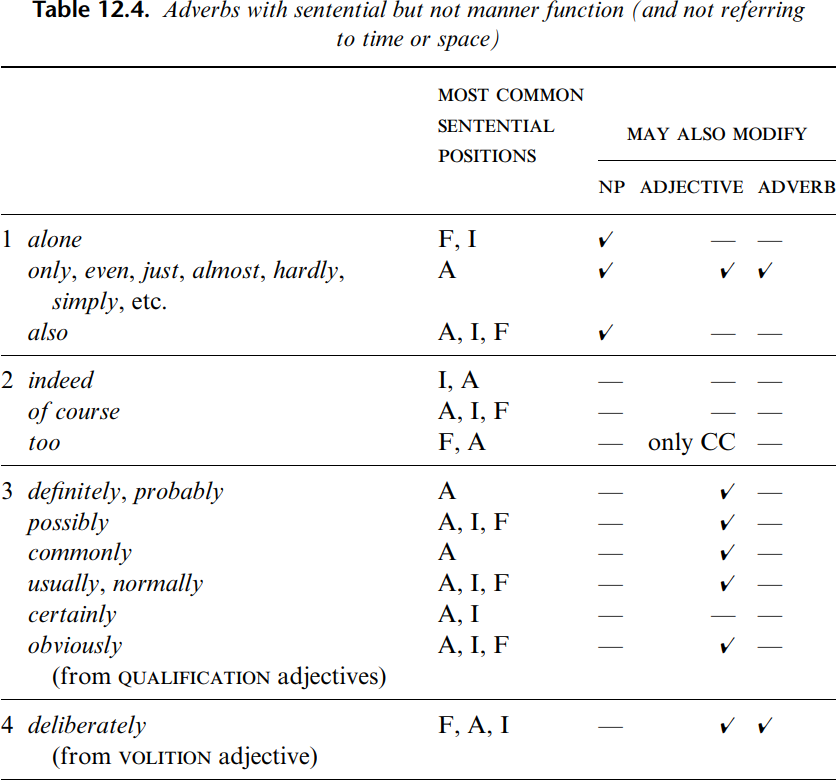


 Grammar
Grammar
 Tenses
Tenses
 Present
Present
 Past
Past
 Future
Future
 Parts Of Speech
Parts Of Speech
 Nouns
Nouns
 Verbs
Verbs
 Adverbs
Adverbs
 Adjectives
Adjectives
 Pronouns
Pronouns
 Pre Position
Pre Position
 Preposition by function
Preposition by function 
 Preposition by construction
Preposition by construction
 Conjunctions
Conjunctions
 Interjections
Interjections
 Grammar Rules
Grammar Rules
 Linguistics
Linguistics
 Semantics
Semantics
 Pragmatics
Pragmatics
 Reading Comprehension
Reading Comprehension|
Read More
Date: 2023-10-09
Date: 2024-08-10
Date: 2023-11-14
|
There is a fair degree of fluidity in the placement of these items, in position A and/or I and/or F. others may very well occur, in appropriate discourse and pragmatic contexts. These adverbs fall into six sets.
(1) Those forms—mostly monosyllabic—which can also modify a full NP, from rows (a–g). Alone occurs in position F and I, also in positions A, F and I, while for the remainder A is the favored position—only, even, just, almost, hardly, simply, mainly, merely, chiefly, etc.
(2) Other monomorphemic forms, plus of course. Indeed typically occurs in position I, otherwise in A, generally with comma intonation. The meaning of indeed naturally correlates with the inclusion of emphatic do; for example, Indeed, John did sign the document or John did, indeed, sign the document. Of course may occur in all three positions, always expecting comma intonation. Adverb too is unusual in that it is normally found in F position, as in John laughed too; less often it may be in A position, with comma intonation, as in John, too, laughed.
All the items in set (1), except for alone and also, may also modify an adjective or an adverb. From set (2), indeed and of course lack these functions. Too may be restricted to modification of an adjective which is in copula complement function. When modifying an adjective or an adverb, it generally expects a following qualification; for example, John is too stupid (to be entrusted with this task), and Mary talks too quickly (for foreigners to understand). The items in sets (3)–(6) may all—except, perhaps, for certainly—modify some adjectives. Some of those in sets (4)–(5) may also modify an adverb.


(3) Adverbs derived by the addition of -ly to monomorphemic QUALIFICATION adjectives (save for the CORRECT subtype, whose adverbs have both sentential and manner functions). These always occur in position A and have varying possibilities for positions I, or for I and F. The peripheral positions generally carry a contrastive meaning; compare He’s obviously forgotten (simple statement of inference) with He’s forgotten, obviously (sardonic overtone, ‘what would you expect of him?’).
Note that the adverb truly has a rather different meaning from the adjective true (which is placed in the same adjectival subtype as definite and probable); truly patterns with really. The adjective likely (in the same subtype as certain) does not form an adverb, no doubt due at least in part to the fact that it already ends in -ly.
Negative congeners of these items tend to have somewhat different meanings and syntactic possibilities. Impossibly cannot be substituted for possibly in He may possibly come, nor uncertainly for certainly in He will certainly come. And one cannot substitute possibly or certainly into He behaved impossibly/uncertainly. Indefinitely has limited use (as in postpone indefinitely), rather different from that of definitely. Uncommonly and commonly have some shared possibilities, as in These plants occur commonly/ uncommonly in the savannah. But they also show differences; one cannot substitute commonly into He did uncommonly/well.
(4) Deliberately, from the VOLITION type. This is most at home in position F, but is also found in I and A. Its antonym, accidentally, in set (5), has the same placements, as does purposefully (which could be from either noun purpose or verb purpose, plus -ful to derive an adjective, plus -ly).
(5) Adverbs which are derived (by the addition of -ly) from already derived adjectives. The first group involves adjectives derived from nouns by the addition of -al. For example:

The second group is based in adjectives ending in -ical, also formed on nouns. For some, but not for others, an intermediate stage of derivation is represented by an adjective ending in -ic. For example:

We also find nouns ending in -ics, which drop the -s to form an adjective, add -al to form another adjective and then -ly to derive an adverb; however, for some of them either the -ic form or the -ical form is missing. Examples include:

Whereas geographic and geographical, poetic and poetical, and pedagogic and pedagogical have pretty much the same meaning, there is a difference between historic and historical, economic and economical, and politic and political (see any good dictionary). There is a further adverb which involves -ly being added to politic, without the intervening -al. For most speakers today, politically and politicly are variants with the same meaning.
All the items in set (5) typically occur in position F. Their predispositions towards placement at I and A vary. There is also the adverb drastically, derived from adjective drastic (there is no noun drastics); however, this functions as a manner adverb.
(6) Adverbs derived (by -ly) from adjectives which are themselves derived from verbs by the addition of -ful; for example, verb forget, adjective forget-ful, adverb forget-ful-ly. Other base verbs include resent, regret, doubt and mourn. These may occur in all of the three positions, F, I and A.
Whereas adverbs from sets (1)–(4) may, potentially, occur with any type of verb, those in sets (5) and (6) are limited to verbs (and adjectives) with a related meaning; for example, Suicidally, she drove the car at two hundred kilometres an hour, The proposal is not economically viable, and He regretfully declined the invitation.
|
|
|
|
تفوقت في الاختبار على الجميع.. فاكهة "خارقة" في عالم التغذية
|
|
|
|
|
|
|
أمين عام أوبك: النفط الخام والغاز الطبيعي "هبة من الله"
|
|
|
|
|
|
|
المجمع العلمي ينظّم ندوة حوارية حول مفهوم العولمة الرقمية في بابل
|
|
|